Updated: 07/02/2024
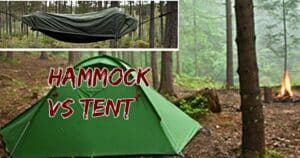 Today, we’re diving into one of the most heated debates among outdoor enthusiasts: hammocks vs. tents.
Today, we’re diving into one of the most heated debates among outdoor enthusiasts: hammocks vs. tents.
That’s right, we’re going to pit these two camping heavyweights against each other and see which one comes out on top for your camping and survival needs.
So grab your compass, lace up your boots, and let’s get this showdown started!
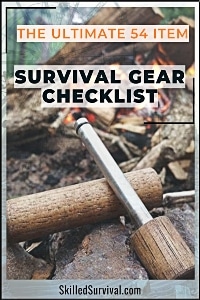
Click here to instantly download this Complete Checklist PDF. No purchase necessary.
Hammock Vs Tent: Comparison Chart

The Contenders: A Brief Overview
Hammocks
Hammocks are the epitome of laid-back camping.
They’re lightweight, compact, and offer a unique sleeping experience that keeps you off the ground and swaying gently between trees.
But don’t be fooled by their relaxed demeanor—hammocks can be a serious contender for your camping and survival gear.
Tents
Tents are the classic choice for campers worldwide.
They’ve been around for centuries, evolving from basic shelters to high-tech engineering marvels.
Tents offer a familiar and reliable way to stay protected from the elements, with plenty of room to stretch out and store your gear.
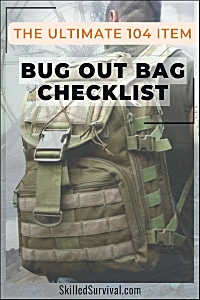
Click here to instantly download this Complete Checklist PDF. No purchase necessary.
Comfort: Rest Easy or Toss and Turn?
When it comes to getting a good night’s sleep in the great outdoors, comfort is king.
Let’s see how hammocks and tents stack up.
Hammocks: Cradle of Comfort
Hammocks are like a cozy cocoon that cradles you in comfort.
The gentle sway can lull you to sleep faster than a lullaby.
Plus, you avoid the hard, uneven ground and any creepy crawlies that might be lurking.
However, getting the perfect hang angle and finding the right trees can be a bit of a challenge.
And if you’re a side or stomach sleeper, you might find a hammock a bit restrictive.
Tents: Home Away from Home
Tents provide a flat, stable surface to sleep on, which is great for side, back, and stomach sleepers alike.
With a good sleeping pad and bag, you can achieve a level of comfort that’s hard to beat.
Tents also offer more room to move around and store your gear, making them feel like a cozy little home in the wilderness.
However, you’re still dealing with the hard ground and the potential for a less-than-perfectly-flat campsite.
Weather Protection: Battling the Elements
Mother Nature can be unpredictable, so your shelter needs to stand up to whatever she throws your way.
Hammocks: High and Dry
One of the biggest advantages of hammocks is that they keep you off the ground.
This means you won’t have to worry about rain pooling under your tent or waking up to a flooded floor.
With a proper rain fly, hammocks can keep you dry in most conditions.
However, in extreme weather, like high winds or heavy snow, hammocks can be less stable and offer less protection than tents.
Tents: Fortresses of Fabric
Tents are designed to be all-weather shelters.
With a good rainfly and proper setup, tents can handle rain, wind, and even snow.
They offer more protection from the elements, especially in extreme conditions.
The solid walls also provide a barrier against cold winds and help retain warmth. However, tents require more effort to keep dry and ventilated, especially in wet conditions.
Setup and Portability: Quick and Easy or a Chore?
Nobody wants to spend hours setting up camp, especially after a long day on the trail.
Let’s see which option makes setting up camp a breeze.
Hammocks: Quick and Lightweight
Hammocks are a breeze to set up—once you get the hang of it (pun intended).
With practice, you can have your hammock and rain fly up in minutes.
They’re incredibly lightweight and pack down small, making them perfect for backpackers and ultralight hikers.
The downside is that you need trees (or something sturdy) to hang your hammock, which isn’t always available.
Tents: Versatile but Bulky
Tents can take a bit longer to set up, especially if you’re dealing with poles, stakes, and rainflies.
But once they’re up, they’re a reliable shelter that doesn’t depend on trees or other anchor points.
Tents offer more versatility in where you can set up camp, but they tend to be bulkier and heavier than hammocks.
This makes them less ideal for ultralight backpacking but great for car camping or short hikes.

Click here to instantly download this Complete Checklist PDF. No purchase necessary.
Space and Storage: Room to Roam or Cozy and Compact?
Whether you like to spread out or keep things minimal, space is a crucial factor in choosing your shelter.
Hammocks: Cozy and Compact
Hammocks are designed for one person (though double hammocks are available), and they don’t offer much room for gear storage.
You’ll need to get creative with your packing and use gear slings or hang your backpack from a tree.
This minimalistic approach is great for those who like to travel light and keep things simple.
However, if you like having space to move around or keep your gear close, hammocks might feel a bit cramped.
Tents: Spacious and Secure
Tents come in a variety of sizes, from solo shelters to multi-person palaces.
They offer plenty of room to move around and store your gear, keeping everything dry and secure.
The extra space can make a big difference in comfort, especially on longer trips.
The downside is that all this extra room comes at a cost in terms of weight and bulk.
Versatility: Multi-Use Marvels
Versatility is key when it comes to survival gear.
Let’s see how hammocks and tents can pull double duty.
Hammocks: More Than Just a Bed
Hammocks can be incredibly versatile.
Besides being a great place to sleep, they can also serve as a chair, lounger, or even a makeshift stretcher in an emergency.
Some hammock setups can be converted into ground shelters if needed.
However, their primary function is as a sleeping system, so their versatility is somewhat limited compared to a tent.
Tents: Shelter Supreme
Tents are the ultimate multi-use shelters.
Besides providing a place to sleep, they can serve as a changing room, gear storage, and a refuge from bugs and weather.
In an emergency, a tent can be used as a signal (bright colors), a rainwater collector (with the rainfly), or even a makeshift raft (in extreme cases).
Their versatility and reliability make them a staple in any survival kit.
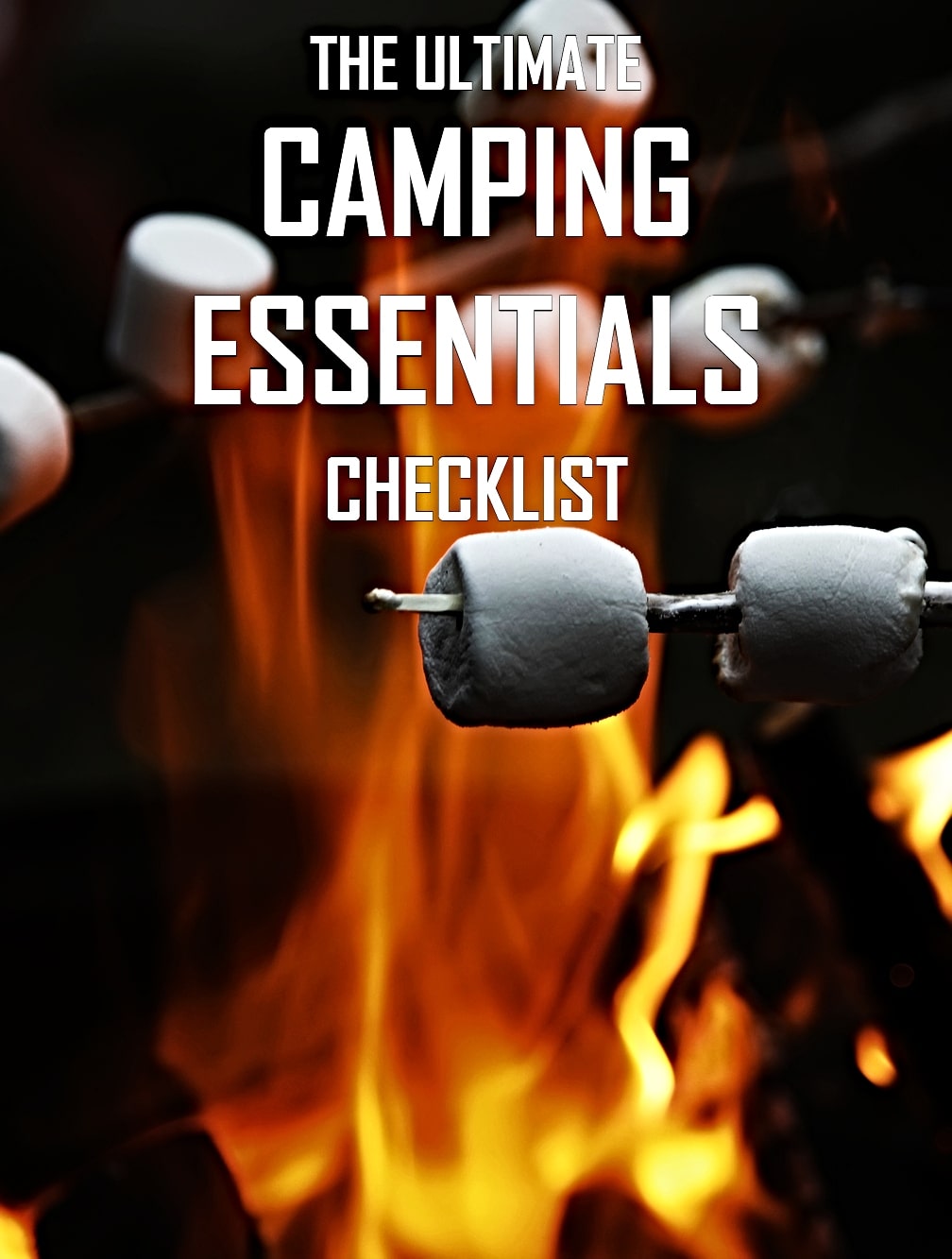
Click here to instantly download this Complete Checklist PDF. No purchase necessary.
Cost: Budget-Friendly or Investment?
When it comes to camping gear, you often get what you pay for.
Let’s talk about the cost of hammocks vs. tents.
Hammocks: Budget-Friendly
Hammocks can be a more budget-friendly option, especially for solo campers.
You can get a decent hammock setup for less than a comparable tent.
However, you’ll also need to consider the cost of additional gear like a rain fly, bug net, and underquilt (for colder weather).
Overall, hammocks can be a great option for those looking to save money and pack light.
Tents: Investment in Comfort
Tents tend to be more expensive, especially high-quality models.
But this investment pays off in terms of comfort, space, and protection from the elements.
If you’re serious about camping or survival, a good tent is worth every penny.
Plus, tents are more versatile and can accommodate multiple people, making them a better value for group camping.
The Verdict: Which is Best for You?
Alright, folks, it’s decision time.
Both hammocks and tents have their strengths and weaknesses, and the best choice depends on your specific needs and preferences.
Choose a Hammock If:
- You prioritize lightweight and compact gear.
- You enjoy a unique sleeping experience and don’t mind a bit of a learning curve.
- You often camp in areas with plenty of trees.
Choose a Tent If:
- You want maximum protection from the elements.
- You need more space and storage for gear.
- You prefer a versatile shelter that can handle a variety of conditions.
My Personal Take
Personally, I think there’s a place for both hammocks and tents in your camping arsenal.
Hammocks are fantastic for short trips, ultralight backpacking, and summer camping.
They’re a blast to use and add a bit of fun to your camping experience.
Tents, on the other hand, are the go-to choice for longer trips, group camping, and harsher conditions.
They offer the comfort, space, and protection you need when the going gets tough.
So why not have both?
That way, you’ll be prepared for any adventure that comes your way.
Just remember, the best shelter is the one you have with you when you need it.
So pick the one that fits your style, pack it up, and get out there!
Why Trust Skilled Survival…
Go here now to review a full breakdown of:
- Who We Are
- Our Credentials
- Our Mission
- & Product Recommendations…
Here are a few highlights of our teams credentials & certifications:
- Certified Member of a Mountain Search & Rescue Organization
- Plant Emergency & Safety Leader for a Major Food Manufacturer
- Member of the 10TH Mountain Division Hut Association
- Certifications: Avalanche 1, WFR, CPR
- Official Gear Tester for Numerous Outdoor Gear Companies
- Countless Multiday Backpacking trips into Remote Wilderness
- Bachelor’s Degree In Mechanical Engineering
- Bachelor’s Degree In Civil Engineering
- Bachelor’s Degree In Biomedical Engineering
“It takes 20 years to build a reputation and five minutes to ruin it.” – Warren Buffett
We’re fully aware that trust is NOT something you GET but is EARNED.
And we’ll continue to earn YOUR trust through our forthright and honest approach with each new Blog Post, Guide & Product we create…
Prepare, Adapt & Overcome,

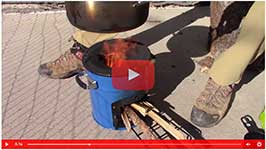

Get My 10 Steps To Basic Preparedness Video For FREE.
Plus daily survival tips (unsubscribe anytime).
Read the full article here
